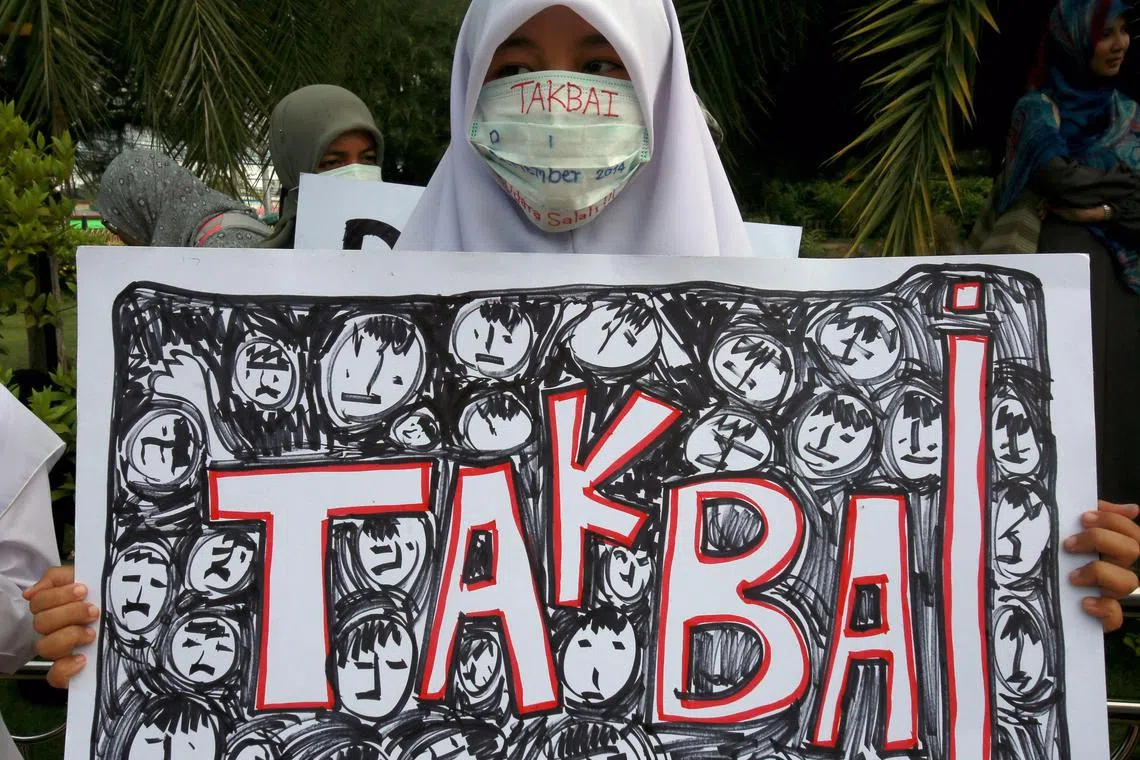2004 Tak Bai massacre: Thai families demand justice as charge deadline expires
Sign up now: Get insights on Asia's fast-moving developments

Twenty years after the Tak Bai massacre, relatives and supporters gathered for prayers to commemorate those who died.
PHOTO: AFP
NARATHIWAT, Thailand - The families of 78 victims who suffocated to death in army trucks in a Thai massacre two decades ago joined survivors on Oct 25 to voice anger that those responsible will never be brought to justice.
Twenty years after the Oct 25, 2004, tragedy, known as the Tak Bai massacre, relatives and supporters gathered for prayers to commemorate those who died.
Apart from being the anniversary of the incident, Oct 25 is also the day the 20-year statute of limitations expires, and murder charges against seven suspects will be dropped.
Prime Minister Paetongtarn Shinawatra – whose father Thaksin Shinawatra was premier at the time of the incident – on Oct 24 apologised on behalf of the government.
But she said it was not possible to extend the statute of limitations or prolong the case, despite appeals from campaigners.
The incident has long stood as an emblem of state impunity in the kingdom’s Muslim-majority southernmost provinces, where conflict has rumbled for years between government forces and separatist insurgents.
“There is no natural justice in our country,” Ms Khalijah Musa, whose brother Sari was killed at Tak Bai, told AFP in an interview, saying that those responsible deserved the death penalty.
“It’s not equal... we in the southernmost provinces are not part of the (Thai) family. Our voices are just not loud enough.”
The conflict in the “deep south” has seen more than 7,000 people killed since January 2004 as security forces have clashed with insurgents seeking greater autonomy for the region, which is culturally distinct from the rest of mostly Buddhist Thailand.
Around 100 relatives, survivors and supporters gathered at the cemetery of a mosque in Narathiwat province on the morning of Oct 25 to pray at a mass grave for the Tak Bai victims.
“It feels like it was only yesterday. I don’t think I can get over it,” Ms Mariyoh Chewae, who lost her brother in the incident, told AFP.
“I hope the Thai state treats everyone equally, no matter which religion we practise.”
Later in nearby Pattani city, activists held an event with songs and speeches to voice frustration at the closing of the Tak Bai legal case.
‘Not worth it’
On that fateful day, security forces opened fire on a crowd protesting outside a police station in the town of Tak Bai in Narathiwat province, close to the Malaysian border, killing seven people.
Subsequently, 78 people suffocated after they were arrested and stacked on top of one another in the back of Thai military trucks, face down and with their hands tied behind their backs.
Mr Mariki Doloh, who survived the incident but had to have one leg amputated, said he was still deeply traumatised by the experience.
“I was just passing by and the police arrested me,” he told AFP. “I don’t understand why they did this to us. I didn’t think I would survive.”
In August, a provincial court accepted a criminal case filed by the victims’ families against seven officials
But the officials – including a former army commander elected to Parliament in 2024 – have avoided appearing in court, preventing the case from progressing.
On Oct 28, the court is expected to formally dismiss the charges, ending a case that has become synonymous with a lack of accountability in a region governed by emergency laws and flooded with army and police units.
No member of the Thai security forces has ever been jailed for extrajudicial killings or torture in the “deep south”, despite years of allegations of abuses across the region.
UN rights experts said they were “extremely alarmed” that the case was closing with no one put on trial.
“Failure to investigate and bring perpetrators to justice is itself a violation of Thailand’s human rights obligations,” the UN experts said in a statement on Oct 24.
In 2012, the government of then Prime Minister Yingluck Shinawatra – Mr Thaksin’s sister and Ms Paetongtarn’s aunt – paid the families of each of the dead 7.5 million baht (S$293,000) in compensation.
But Ms Parida Tohle, 72, whose only son Saroj, 26, died in one of the trucks, said the compensation meant little.
“In exchange for my son’s life, it was not worth it,” she said. AFP


